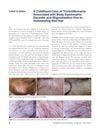 1 citations,
January 2002 in “Dermatology + psychosomatics”
1 citations,
January 2002 in “Dermatology + psychosomatics” Most people worried about abnormal hair loss actually have psychological issues like depression or anxiety.
 138 citations,
March 2001 in “Clinics in Dermatology”
138 citations,
March 2001 in “Clinics in Dermatology” Hair loss can significantly affect a person's self-esteem and body image, especially in young people, those who value their looks highly, and women.
[object Object]  January 2002 in “Dermatology + psychosomatics”
January 2002 in “Dermatology + psychosomatics”  13 citations,
June 2015 in “International Journal of Dermatology”
13 citations,
June 2015 in “International Journal of Dermatology” Patients with hair loss are much more likely to have body dysmorphic disorder than general dermatology patients.
 July 2012 in “Hair transplant forum international”
July 2012 in “Hair transplant forum international” Hair transplant improved self-perception in hair loss patients, but some still remained overly focused on their hair appearance.
 1 citations,
January 2013 in “International Journal of Trichology”
1 citations,
January 2013 in “International Journal of Trichology” A girl with red hair developed hair-pulling and body image disorders after being bullied for her hair color.
 March 2023 in “The primary care companion for CNS disorders”
March 2023 in “The primary care companion for CNS disorders” Dengue fever can cause hair loss that may lead to serious psychological issues like Body Dysmorphic Disorder in young women.
 December 2024 in “Brazilian Journal of Hair Health”
December 2024 in “Brazilian Journal of Hair Health” Treating both bipolar disorder and hair-related BDD with psychiatric medications improved the patient's symptoms.
 3 citations,
October 2021 in “Indian Journal of Plastic Surgery”
3 citations,
October 2021 in “Indian Journal of Plastic Surgery” Not all hair loss patients are suitable for hair transplant due to various conditions like unstable hair loss, insufficient hair loss, very young age, unrealistic expectations, certain psychological disorders, and medical unfitness.
 November 2012 in “Hair transplant forum international”
November 2012 in “Hair transplant forum international” Hair loss patients may often have Body Dysmorphic Disorder, and proper psychological assessment and treatment can help.

Hair loss can significantly affect mental health.
 20 citations,
November 2012 in “Journal der Deutschen Dermatologischen Gesellschaft”
20 citations,
November 2012 in “Journal der Deutschen Dermatologischen Gesellschaft” Hair diseases can have psychological effects and should be treated with a combination of psychosomatic care, therapy, and medication.
 2 citations,
June 2016 in “Dermatologic Clinics”
2 citations,
June 2016 in “Dermatologic Clinics” Dermatologists often neglect hair disorders due to complexity and lack of clear treatments, impacting patient care and highlighting the need for better education and interest in this area.
 March 2014 in “Hair transplant forum international”
March 2014 in “Hair transplant forum international” Hair transplant surgeons should also focus on their patients' overall health, including regular check-ups and screening for common health issues.
January 1999 in “대한피부과학회지” Trichotillomania is more common in young females and often linked to stress and psychiatric conditions, with hair loss and increased catagen hair observed.
 July 2008 in “Expert Review of Dermatology”
July 2008 in “Expert Review of Dermatology” Proper planning for hair transplants is crucial for natural results, with careful patient selection and strategic graft placement being key factors.
 1 citations,
November 2008 in “Gerontology”
1 citations,
November 2008 in “Gerontology” Older adults use lifestyle drugs to improve life quality and appearance, but caution is needed due to side effects and potential abuse.
 10 citations,
March 2018 in “Anais Brasileiros De Dermatologia”
10 citations,
March 2018 in “Anais Brasileiros De Dermatologia” More hair loss leads to higher risk of psychosexual disorders, especially in women.
 14 citations,
January 2013 in “International Journal of Trichology”
14 citations,
January 2013 in “International Journal of Trichology” Treating hair loss requires a comprehensive approach that addresses both physical and emotional aspects, with a focus on diagnosis, patient education, and good communication.
 9 citations,
February 2016 in “Cambridge University Press eBooks”
9 citations,
February 2016 in “Cambridge University Press eBooks” The conclusion is that self-concept, shame, and emotion regulation are key factors in hoarding disorder, body dysmorphic disorder, and trichotillomania, and should be targeted in treatment and research.
 June 2011 in “The Journal for Nurse Practitioners”
June 2011 in “The Journal for Nurse Practitioners” Up to half of adult women may experience hair loss, and doctors should use medical history, exams, and tests to find the cause and treat it.
 January 2012 in “Elsevier eBooks”
January 2012 in “Elsevier eBooks” Hair loss can cause emotional and social issues, and various treatments, including medication, surgery, and psychological support, are needed.
 6 citations,
May 2017 in “InTech eBooks”
6 citations,
May 2017 in “InTech eBooks” Hair loss can cause serious mental health problems and treating it requires a team of experts.
 45 citations,
March 2010 in “Journal der Deutschen Dermatologischen Gesellschaft”
45 citations,
March 2010 in “Journal der Deutschen Dermatologischen Gesellschaft” A systematic approach is crucial for managing hair loss in women.
 November 2022 in “Skin health and disease”
November 2022 in “Skin health and disease” People with hair loss conditions often have more mental health issues like depression and anxiety compared to those without hair loss.
 15 citations,
September 2015 in “Journal der Deutschen Dermatologischen Gesellschaft”
15 citations,
September 2015 in “Journal der Deutschen Dermatologischen Gesellschaft” Skin doctors should recognize and treat conditions like hair-pulling and skin-picking early, often using therapy and medication, to help 50-70% of patients.
 May 2017 in “InTech eBooks”
May 2017 in “InTech eBooks” Hair pulling disorder is treated with therapy and medication; hair loss from tension can be reversed if caught early.
[object Object]  October 2016 in “Iranian journal of psychiatry and behavioral sciences”
October 2016 in “Iranian journal of psychiatry and behavioral sciences” Sertraline, an antidepressant, may cause hair loss in rare cases.
 January 2017 in “International journal of science and research”
January 2017 in “International journal of science and research” Trichotillomania is a chronic hair-pulling disorder, more common in females, treated with therapy and sometimes medication.
 21 citations,
September 2016 in “Journal of Dermatological Treatment”
21 citations,
September 2016 in “Journal of Dermatological Treatment” The new classification system for skin disorders emphasizes the importance of understanding a patient's awareness of their condition for better treatment.





























